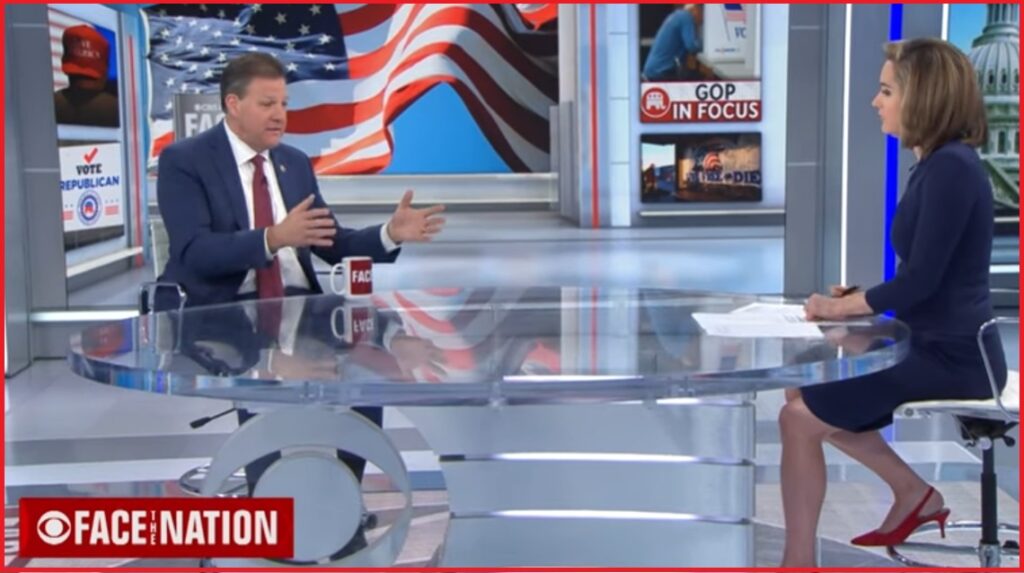If you accept the likelihood of the 2024 Wall Street Republican roadmap being the defining difference between 2016 and 2024, then you can easily see how the Republican Governor’s Association (RGA), the state level system where the policy of GOP governors are purchased by big money, will be the driving influence. It is into this mixed manipulation where New Hampshire Governor Chris Sununu becomes of strategic value.
Someone has to try and maintain the narrative of “free markets” as a Republican priority, enter Chris Sununu. Readers here and middle-class workers of America have decades of experience seeing exactly what the outcome of Republican “free market” capitalism creates. Selling out the U.S. worker and manufacturing base in favor of globalism, multinational corporate exploitation and profits at any cost are the result. In modern economic reality, there is no such thing as a “free market,” there are only controlled markets {GO DEEP}.
Pushing the conservative ‘free market’ narrative, the corporate controlled Chris Sununu appears on Face the Nation to gaslight the base republican voter with old catchphrases that used to work; they no longer do. People can now see through the rustbelt prism and identify the destruction created by the Wall Street funded UniParty apparatus. This is what 2024 presidential candidate Chris Sununu is trying to lie about. However, no republican candidate is an economic nationalist, except President Donald Trump. WATCH:
[Transcript] – MARGARET BRENNAN: Welcome back to Face the Nation. We’re joined now by the Republican governor of New Hampshire, Chris Sununu. And it’s good to have you here…
GOVERNOR CHRIS SUNUNU (R-New Hampshire): Thanks.
MARGARET BRENNAN: … in person.
GOVERNOR CHRIS SUNUNU: Great to be here. Better here than the rest of Washington, because this whole town gives me the — it gives me the chills sometimes.
(LAUGHTER)
MARGARET BRENNAN: Well, you might need to go get over that if you’re going to run for 1600 Pennsylvania Avenue, as, apparently, you are considering doing.
GOVERNOR CHRIS SUNUNU: Well, look, a lot of opportunity to change things, right?
I think New Hampshire has this awesome model of live free or die, limited government, local control, individual responsibility, really putting the voters first, send them some money, which is nice, but send them the regulatory authority too.
So a little decentralizing out of Washington and maybe a little better attitude would be — would be a good thing for America.
MARGARET BRENNAN: What’s the proactive reason you want to be president, not something that President Biden is doing wrong…
GOVERNOR CHRIS SUNUNU: Sure.
MARGARET BRENNAN: … but something you want to achieve?
GOVERNOR CHRIS SUNUNU: Yes, which is the right question you’re asking, by the way, because I — it drives me crazy when Republicans talk in an echo chamber about how bad the president is, and Democrats.
We got the memo, as Republicans. You got to be for something. What I’m trying to do is kind of show that New Hampshire model, show the opportunity to get stuff done. I have had Republicans in my legislature. I have Democrats in my legislature. I always get my conservative agendas done.
We always cut taxes. We always balance a budget. And I can explain to folks in Washington what a balanced budget actually means. So, there are paths. And I think America is looking for results. We need results-driven leadership, not just leadership that…
MARGARET BRENNAN: Like what?
GOVERNOR CHRIS SUNUNU: Look, whether it’s cutting taxes, being pro- business, the regulatory reform, the immigration stuff that we were told was going to happen in 2017 and 2018 as Republicans, and it didn’t.
We were told health care reform would happen. It didn’t. We were told we were going to secure the border, and we didn’t. So, there’s all this great opportunity that has a domino effect. They’re not just things to check off a list, but those things have huge impacts on the American economy and, most importantly, American families, right?
They just want flexibility to do what they do. And, frankly, they’re tired of the nonsense in D.C. They’re tired of — of extreme candidates. They’re tired of gridlock. They want somebody to come to the table. And it could be myself. It could be other governors. It could — but it has to be leadership with proven results.
MARGARET BRENNAN: Yes.
GOVERNOR CHRIS SUNUNU: I have been in the private sector as an engineer and a business leader. I have been in the public sector. You got to be able to deliver.
And you got to, hopefully, be inspirational and hopeful, as opposed to all this negativity you see.
MARGARET BRENNAN: But you still have to get the Congress to work with you to do that very long laundry list of things you just read off to us.
So, when you were here in November, you told us that President Biden would not run for president, in your estimation. You just saw him up close for the past few days.
GOVERNOR CHRIS SUNUNU: Yes.
MARGARET BRENNAN: Is that still what you believe?
GOVERNOR CHRIS SUNUNU: Well, I know other people will definitely run. They’re going to get in the race.
MARGARET BRENNAN: Democrats, you believe, will challenge him?
GOVERNOR CHRIS SUNUNU: Oh, absolutely, yes, yes, because…
MARGARET BRENNAN: Why do you say that? Did someone tell you that in the last few days?
GOVERNOR CHRIS SUNUNU: Well, Joe Biden has tried to move the first-in-the- nation primary from New Hampshire, right? But we’re going to — we’re going first, whether the president likes it or not.
And so that’s going to be a huge opportunity for anybody who wants to step up and challenge him. And if you look at the polls across the country, the average Democrat says, yes, thanks for your service on one term, but let’s keep it to one term, President Biden.
And I just don’t believe the Democrat left-wing elite is going to sit on the sidelines, knowing you could come to New Hampshire, get all the earned media, all the attention…
MARGARET BRENNAN: OK.
GOVERNOR CHRIS SUNUNU: … without a whole lot of money, all that political momentum. He’s opened up his political flank, so to say, to give someone else a huge opportunity to charge right through and take that nomination from him.
MARGARET BRENNAN: Well, we’ll see if your — if your projection plays out.
You’ve been talking about trying to sort of remind the party that Republicans are about limited government.
GOVERNOR CHRIS SUNUNU: Yes.
MARGARET BRENNAN: You said recently: “Republicans are almost trying to outdo Democrats at their own game of being big government and having a solution and a say on everything.”
Who were you thinking of when you say that?
GOVERNOR CHRIS SUNUNU: Oh, there’s a lot — look, I think there’s a lot of leadership out there that forget — that forgets.
At heart, I’m a principled free market conservative. Let the markets decide. So there’s no individual, per se, but there’s a lot of leadership that says, you know what, when we’re not getting that result out of a private business or locality, we’ll just impose from the top down our conservative will.
MARGARET BRENNAN: You’re not talking…
GOVERNOR CHRIS SUNUNU: Yes.
MARGARET BRENNAN: … about the Florida governor and Disney, for example, are you?
GOVERNOR CHRIS SUNUNU: Well, that’s a bad example. Yes, that’s — that’s an example, one of the many examples you see out there.
MARGARET BRENNAN: Ron DeSantis may be running for president as well.
GOVERNOR CHRIS SUNUNU: Sure. Yes.
Yes, look, Ron’s a very good governor. He is. But I’m just trying to remind folks what we are at our core. And if we’re trying to beat the Democrats at being big government authoritarians, remember what’s going to happen. Eventually, they’ll have power in a state or in a position, and then they’ll start penalizing conservative businesses and conservative nonprofits and conservative ideas.
That is the worst precedent in the world. That’s exactly what the founding fathers tried not to — tried to avoid. And so I’m trying to remind my conservative friends about federalism, free markets, and being for the voter first, being for the individual.
Do I like what every private business says? No, I hate this woke cancel culture. But it’s a cultural…
MARGARET BRENNAN: What does that mean to you then?
GOVERNOR CHRIS SUNUNU: Woke cancel culture?
MARGARET BRENNAN: Yes.
GOVERNOR CHRIS SUNUNU: Oh, it’s — it’s — look, it’s…
MARGARET BRENNAN: Because you’re not a culture warrior, really.
GOVERNOR CHRIS SUNUNU: No, no, no. No, but it’s there.
MARGARET BRENNAN: What does woke cult — what does that mean in your platform?
GOVERNOR CHRIS SUNUNU: It’s the — it’s the divisiveness — divisiveness we see not just in our schools, but in our communities, where it is me vs. you, whereas, if you are not adhering to my ideals, then I’m going to cancel you out.
It is us vs. them. It is this binary where everything’s a war. That’s a cultural problem we have to fix in America. And it starts with good leadership, good messaging, more hopeful and optimistic. But government never solves a cultural problem.
MARGARET BRENNAN: OK. Well…
GOVERNOR CHRIS SUNUNU: We can lead on it, but we never solve it.
MARGARET BRENNAN: Interesting idea, but you are contradicted by the Republican governor of Arkansas, who gave the response for your party after the State of the Union, who embraced culture war.
She says America’s in one.
GOVERNOR CHRIS SUNUNU: Yes, we are.
MARGARET BRENNAN: She says it’s been waged by the left wing, “a woke mob that can’t even tell you what a woman is.”
GOVERNOR CHRIS SUNUNU: That’s absolutely right. And that’s…
MARGARET BRENNAN: I mean, are you going to engage on things like this, like — like Sanders and DeSantis has in terms of issues on gender and issues of race?
GOVERNOR CHRIS SUNUNU: There should be absolute leadership on that about what that’s about.
And this idea that you have to — you know, we have forced language, that we have forced ideas on our kids, that we’re going to force anything…
MARGARET BRENNAN: So you are going to be a culture warrior?
GOVERNOR CHRIS SUNUNU: No, we have to talk about that, but it isn’t the government’s role to solve it.
The government is not here to solve your problems. It’s not. The government is here to include as many…
(CROSSTALK)
MARGARET BRENNAN: So, governors shouldn’t be actually talking and engaging and telling school boards and doing things like this or trying to pass laws like they are?
GOVERNOR CHRIS SUNUNU: I don’t think governors should be trying to pass laws to subvert the will of the voters that know better than us.
Voters are — know more than I do. The voters on that school board know, the voters in those towns know a lot more. And if — that’s the free market of politics. If they don’t like the school board, they get — they go to a town meeting, they fire them.
MARGARET BRENNAN: You are — you call yourself a pro-choice Republican.
You still have to win in a Republican primary.
GOVERNOR CHRIS SUNUNU: Sure.
MARGARET BRENNAN: Is there room for someone who calls himself a pro-choice Republican?
GOVERNOR CHRIS SUNUNU: Oh, yes, look, that issue is — look, that issue is going to change three different ways now that Dobbs has happened, right? States can decide what they want to do, right?
So, I think the definition of pro-life and pro-choice and pro-abortion are — are going to be very different, because if you’re a pro-life Republican, that’s fine. That’s — as a governor, you can do that. You can ban it in your state, and you can stay — stand behind those ideals. And maybe that’s exactly what your state wants. No problem.
I’m a pro-choice Republican in a very pro-choice state. But, at the end of the day, you’re going to have the pro-lifer over here…
MARGARET BRENNAN: Yes.
GOVERNOR CHRIS SUNUNU: .. pro-abortion over here, and then the rest of us are, well, we have a 24-week ban, and you have a 22-week…
MARGARET BRENNAN: Yes.
GOVERNOR CHRIS SUNUNU: … and an 18-week ban.
So, the rest of us are kind of in this spectrum of debating about weeks. So that the whole conversation is going to change.
MARGARET BRENNAN: We want to talk about some of these issues in-depth with you in a moment, so stay with us, Governor.
And we’re going to bring in a panel of bipartisan governors with us.
Positive debate on solutions and constructive criticism of approach is always appropriate for our elected officials; heck, that is the essence of our discussion. However, recently there have been many critics of President Trump; many people only just now understanding the problem and proclaiming that President Trump specifically did not do enough to block, impede, stop and counteract the globalist forces that were/are aligned against his effort to Make America Great Again.
Hindsight is 20/20, but there are people who proclaim that Donald J Trump should have been more wise in his counsel; more selective in his cabinet; more forceful in his confrontation of corporate globalists. Let me be clear….
I will never join that crew of Trump critics because I have understood his adversary for decades. CTH did not just come around to the understanding of the enemy. CTH has been outlining the scope of the enemy, the scale of the specific war and the financial and economic power of the opposition for over a decade. We understand the totality of the effort it will take to stop decades of willful blindness amid the American people. We also see with clear eyes exactly what they are doing now, even with President Trump forcefully removed from office, to destroy the threat he still represents.
Donald J Trump was/is a walking red-pill; a “touchstone”: a visible, empirical test or criterion for determining the quality or genuineness of anything political. I have been deep enough into the network of the Deep State to understand the scale and scope of this enemy. To think that President Trump alone could carry the burden of correcting four decades of severe corruption of all things political, without simultaneously considering the scale of the financial opposition, is naive in the extreme.
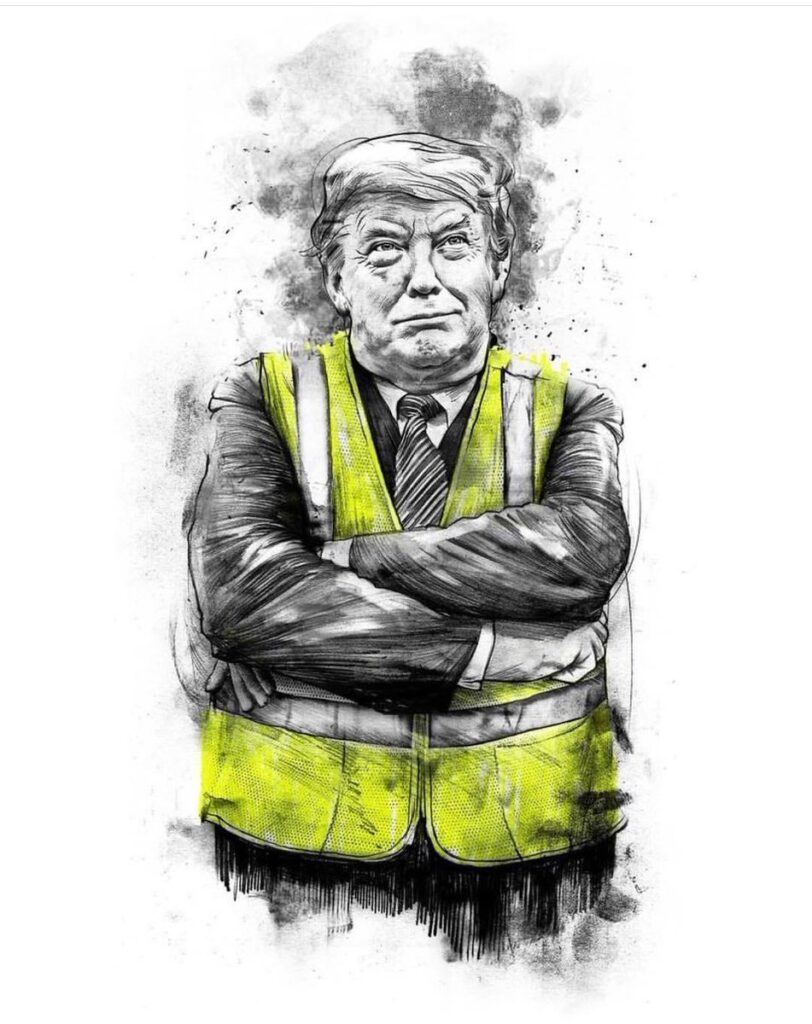 ♦ POTUS Trump was disrupting the global order of things in order to protect and preserve the shrinking interests of the U.S. He was fighting, almost single-handed, at the threshold of the abyss. Our American interests, our MAGAnomic position, was/is essentially zero-sum. His DC and Wall-Street aligned opposition (writ large) needed to repel and retain the status-quo. They desperately wanted him removed so they could return to full economic control over the U.S, because it is the foundation of their power.
♦ POTUS Trump was disrupting the global order of things in order to protect and preserve the shrinking interests of the U.S. He was fighting, almost single-handed, at the threshold of the abyss. Our American interests, our MAGAnomic position, was/is essentially zero-sum. His DC and Wall-Street aligned opposition (writ large) needed to repel and retain the status-quo. They desperately wanted him removed so they could return to full economic control over the U.S, because it is the foundation of their power.
You want to criticize him for fighting harder against those interests than any single man has ever done before him? If so, do it without me.
I am thankful for the awakening Donald J Trump has provided.
I am thankful now for the opportunity to fight with people who finally understand the scale of our opposition.
Without Donald J Trump these entities would still be operating in the shadows. With Donald J Trump we can clearly see who the real enemy is.
In these economic endeavors President Trump was disrupting decades of financial schemes established to use the U.S. as a host for their endeavors. President Trump was confronting multinational corporations and the global constructs of economic systems that were put in place to the detriment of the host (USA) ie YOU. There are trillions at stake; it is all about the economics; everything else is chaff and countermeasures.
The road to a “service-driven economy” is paved with a great disparity between financial classes. The wealth gap is directly related to the inability of the middle-class to thrive.
Elite financial interests, including those within Washington DC, gain wealth and power, the U.S. workforce is reduced to servitude, “service”, of their affluent needs.
The destruction of the U.S. industrial and manufacturing base is EXACTLY WHY the middle class has struggled, and exactly why the wealth gap exploded in the past 30 years.
Behind this dynamic we find the international corporate and financial interests who are inherently at risk from President Trump’s “America-First” economic and trade platform. Believe it or not, President Trump is up against an entire world economic establishment.
When we understand how trade works in the modern era we understand why the agents within the system are so adamantly opposed to U.S. President Trump.
♦The biggest lie in modern economics, willingly spread and maintained by corporate media, is that a system of global markets still exists.
It doesn’t.

Every element of global economic trade is controlled and exploited by massive institutions, multinational banks and multinational corporations. Institutions like the World Trade Organization (WTO) and World Bank control trillions of dollars in economic activity.
Underneath that economic activity there are people who hold the reigns of power over the outcomes. These individuals and groups are the stakeholders in direct opposition to principles of America-First national economics. Collectively known as “The Big Club”.
The modern financial constructs of these entities have been established over the course of the past three decades. When you understand how they manipulate the economic system of individual nations you begin to understand why they are so fundamentally opposed to President Trump.
In the Western World, separate from communist control perspectives (ie. China), “Global markets” are a modern myth; nothing more than a talking point meant to keep people satiated with sound bites they might find familiar. Global markets have been destroyed over the past three decades by multinational corporations who control the products formerly contained within global markets.
The same is true for “Commodities Markets”. The multinational trade and economic system, run by corporations and multinational banks, now controls the product outputs of independent nations. The free market economic system has been usurped by entities who create what is best described as ‘controlled markets’.
U.S. President Trump understood what had taken place. He used economic leverage as part of a broader national security policy; and to understand who opposes President Trump specifically because of the economic leverage he creates, it becomes important to understand the objectives of the global and financial elite who run and operate the institutions. The Big Club.
Understanding how trillions of trade dollars influence geopolitical policy we begin to understand the three-decade global financial construct they seek to retain and protect.
That is, global financial exploitation of national markets.
FOUR BASIC ELEMENTS:
♦Multinational corporations purchase controlling interests in various national outputs (harvests and raw materials), and ancillary industries, of developed industrial western nations. {example}
♦The Multinational Corporations making the purchases are underwritten by massive global financial institutions, multinational banks. (*note* in China it is the communist government underwriting the purchase)
♦The Multinational Banks and the Multinational Corporations then utilize lobbying interests to manipulate the internal political policy of the targeted nation state(s).
♦With control over the targeted national industry or interest, the multinationals then leverage export of the national asset (exfiltration) through trade agreements structured to the benefit of lesser developed nation states – where they have previously established a proactive financial footprint.
Against the backdrop of President Trump confronting China; and against the backdrop of NAFTA renegotiated; and against the necessary need to support the key U.S. steel and aluminum industries; revisiting the economic influences within the modern import/export dynamic will help conceptualize the issues at the heart of the matter.
There are a myriad of interests within each trade sector that make specific explanation very challenging; however, here’s the basic outline.
For three decades economic “globalism” has advanced, quickly. Everyone accepts this statement, yet few actually stop to ask who and what are behind this – and why?
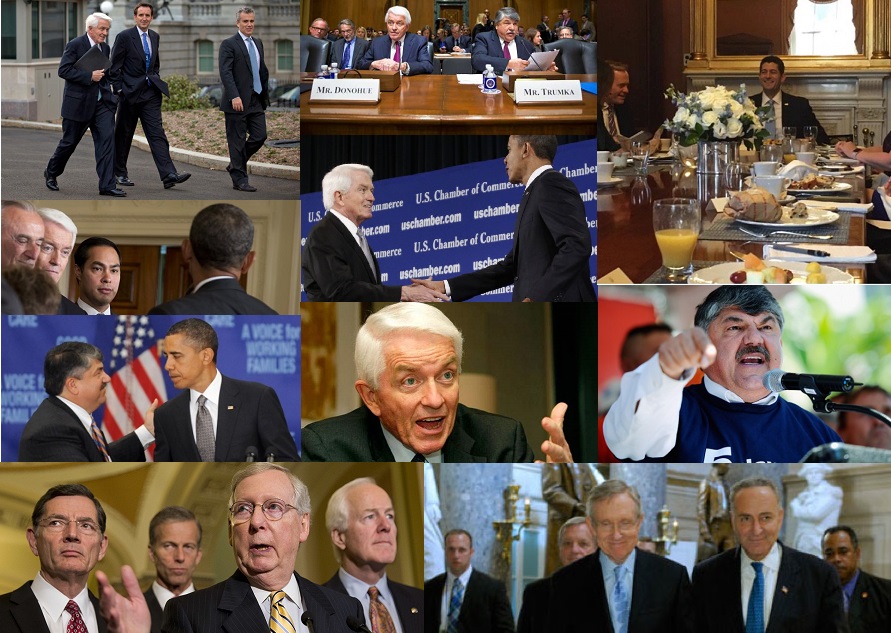
Influential people with vested financial interests in the process have sold a narrative that global manufacturing, global sourcing, and global production was the inherent way of the future. The same voices claimed the American economy was consigned to become a “service-driven economy.”
What was always missed in these discussions is that advocates selling this global-economy message have a vested financial and ideological interest in convincing the information consumer it is all just a natural outcome of economic progress.
It’s not.
It’s not natural at all. It is a process that is entirely controlled, promoted and utilized by large conglomerates, lobbyists, purchased politicians and massive financial corporations.
Again, I’ll try to retain the larger altitude perspective without falling into the traps of the esoteric weeds. I freely admit this is tough to explain and I may not be successful.
Bulletpoint #1: ♦ Multinational corporations purchase controlling interests in various national elements of developed industrial western nations.
This is perhaps the most challenging to understand. In essence, thanks specifically to the way the World Trade Organization (WTO) was established in 1995, national companies expanded their influence into multiple nations, across a myriad of industries and economic sectors (energy, agriculture, raw earth minerals, etc.). This is the basic underpinning of national companies becoming multinational corporations.
Think of these multinational corporations as global entities now powerful enough to reach into multiple nations -simultaneously- and purchase controlling interests in a single economic commodity.
A historic reference point might be the original multinational enterprise, energy via oil production. (Exxon, Mobil, BP, etc.)
However, in the modern global world, it’s not just oil; the resource and product procurement extends to virtually every possible commodity and industry. From the very visible (wheat/corn) to the obscure (small minerals, and even flowers).
Bulletpoint #2 ♦ The Multinational Corporations making the purchases are underwritten by massive global financial institutions, multinational banks.
During the past several decades national companies merged. The largest lemon producer company in Brazil, merges with the largest lemon company in Mexico, merges with the largest lemon company in Argentina, merges with the largest lemon company in the U.S., etc. etc. National companies, formerly of one nation, become “continental” companies with control over an entire continent of nations.
…. or it could be over several continents or even the entire world market of Lemon/Widget production. These are now multinational corporations. They hold interests in specific segments (this example lemons) across a broad variety of individual nations.
National laws on Monopoly building are not the same in all nations. Most are not as structured as the U.S.A or other more developed nations (with more laws). During the acquisition phase, when encountering a highly developed nation with monopoly laws, the process of an umbrella corporation might be needed to purchase the targeted interests within a specific nation. The example of Monsanto applies here.
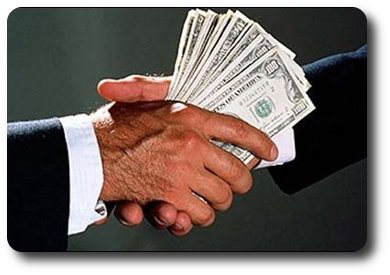 Bulletpoint #3 ♦The Multinational Banks and the Multinational Corporations then utilize lobbying interests to manipulate the internal political policy of the targeted nation state(s).
Bulletpoint #3 ♦The Multinational Banks and the Multinational Corporations then utilize lobbying interests to manipulate the internal political policy of the targeted nation state(s).
With control of the majority of actual lemons the multinational corporation now holds a different set of financial values than a local farmer or national market. This is why commodities exchanges are essentially dead.
In the aggregate the mercantile exchange is no longer a free or supply-based market; it is now a controlled market exploited by mega-sized multinational corporations.
Instead of the traditional ‘supply/demand’ equation determining prices, the corporations look to see what nations can afford what prices. The supply of the controlled product is then distributed to the country according to their ability to afford the price. This is essentially the bastardized and politicized function of the World Trade Organization (WTO). This is also how the corporations controlling WTO policy maximize profits.
Back to the lemons. A multinational corporation might hold the rights to the majority of the lemon production in Brazil, Argentina and California/Florida. The price the U.S. consumer pays for the lemons is directed by the amount of inventory (distribution) the controlling corporation allows in the U.S.
If the U.S. lemon harvest is abundant, the controlling interests will export the product to keep the U.S. consumer spending at peak or optimal price. A U.S. customer might pay $2 for a lemon, a Mexican customer might pay .50¢, and a Canadian $1.25.
The bottom line issue is the national supply (in this example ‘harvest/yield’) is not driving the national price because the supply is now controlled by massive multinational corporations.
The mistake people often make is calling this a “global commodity” process. In the modern era this “global commodity” phrase is particularly nonsense.
A true global commodity is a process of individual nations harvesting/creating a similar product and bringing that product to a global market. Individual nations each independently engaged in creating a similar product.
Under modern globalism this process no longer takes place. It’s a complete fraud. Massive multinational corporations control the majority of production inside each nation and therefore control the global product market and price. It is a controlled system.
EXAMPLE: Part of the lobbying in the food industry is to advocate for the expansion of U.S. taxpayer benefits to underwrite the costs of the domestic food products they control. By lobbying DC these multinational corporations get congress and policy-makers to expand the basis of who can use Food Stamps, EBT and SNAP benefits (state reimbursement rates).
Expanding the federal subsidy for food purchases is part of the corporate profit dynamic.
With increased taxpayer subsidies, the food price controllers can charge more domestically and export more of the product internationally. Taxes, via subsidies, go into their profit margins. The corporations then use a portion of those enhanced profits in contributions to the politicians. It’s a circle of money.
In highly developed nations this multinational corporate process requires the corporation to purchase the domestic political process (as above) with individual nations allowing the exploitation in varying degrees. As such, the corporate lobbyists pay hundreds of millions to politicians for changes in policies and regulations; one sector, one product, or one industry at a time. These are specialized lobbyists.
It is ironic when we discuss corporate financial payments to government officials in foreign countries we call them corrupt. However, in the United States we call it lobbying, the process is exactly the same.

EXAMPLE: The Committee on Foreign Investment in the United States (CFIUS)
CFIUS is an inter-agency committee authorized to review transactions that could result in control of a U.S. business by a foreign person (“covered transactions”), in order to determine the effect of such transactions on the national security of the United States.
CFIUS operates pursuant to section 721 of the Defense Production Act of 1950, as amended by the Foreign Investment and National Security Act of 2007 (FINSA) (section 721) and as implemented by Executive Order 11858, as amended, and regulations at 31 C.F.R. Part 800.
The CFIUS process has been the subject of significant reforms over the past several years. These include numerous improvements in internal CFIUS procedures, enactment of FINSA in July 2007, amendment of Executive Order 11858 in January 2008, revision of the CFIUS regulations in November 2008, and publication of guidance on CFIUS’s national security considerations in December 2008 (more)
Bulletpoint #4 ♦ With control over the targeted national industry or interest, the multinationals then leverage export of the national asset (exfiltration) through trade agreements structured to the benefit of lesser developed nation states – where they have previously established a proactive financial footprint.
The process of charging the U.S. consumer more for a product, that under normal national market conditions would cost less, is a process called exfiltration of wealth. This is the basic premise, the cornerstone, behind the catch-phrase ‘globalism’.
It is never discussed.
To control the market price some contracted product may even be secured and shipped with the intent to allow it to sit idle (or rot). It’s all about controlling the price and maximizing the profit equation. To gain the same $1 profit a widget multinational might have to sell 20 widgets in El-Salvador (.25¢ each), or two widgets in the U.S. ($2.50/each).
Think of the process like the historic reference of OPEC (Oil Producing Economic Countries). Only in the modern era massive corporations are playing the role of OPEC and it’s not oil being controlled, thanks to the WTO it’s almost everything.
Again, this is highlighted in the example of taxpayers subsidizing the food sector (EBT, SNAP etc.), the corporations can charge U.S. consumers more. Ex. more beef is exported, red meat prices remain high at the grocery store, but subsidized U.S. consumers can better afford the high prices.
Of course, if you are not receiving food payment assistance (middle-class) you can’t eat the steaks because you can’t afford them. (Not accidentally, it’s the same scheme in the ObamaCare healthcare system)
 Agriculturally, multinational corporate Monsanto says: ‘all your harvests are belong to us‘. Contract with us, or you lose because we can control the market price of your end product. Downside is that once you sign that contract, you agree to terms that are entirely created by the financial interests of the larger corporation; not your farm.
Agriculturally, multinational corporate Monsanto says: ‘all your harvests are belong to us‘. Contract with us, or you lose because we can control the market price of your end product. Downside is that once you sign that contract, you agree to terms that are entirely created by the financial interests of the larger corporation; not your farm.
The multinational agriculture lobby is massive. We willingly feed the world as part of the system; but you as a grocery customer pay more per unit at the grocery store because domestic supply no longer determines domestic price.
Within the agriculture community the (feed-the-world) production export factor also drives the need for labor. Labor is a cost. The multinational corps have a vested interest in low labor costs. Ergo, open border policies. (ie. willingly purchased republicans not supporting border wall etc.).
This corrupt economic manipulation/exploitation applies over multiple sectors, and even in the sub-sector of an industry like steel. China/India purchases the raw material, coking coal, then sells the finished good (rolled steel) back to the global market at a discount. Or it could be rubber, or concrete, or plastic, or frozen chicken parts etc.
The ‘America First’ Trump-Trade Doctrine upset the entire construct of this multinational export/control dynamic. Team Trump focused exclusively on bilateral trade deals, with specific trade agreements targeted toward individual nations (not national corporations).
‘America-First’ is also specific policy at a granular product level looking out for the national interests of the United States, U.S. workers, U.S. companies and U.S. consumers.
Under President Trump’s Trade positions, balanced and fair trade with strong regulatory control over national assets, exfiltration of U.S. national wealth is essentially stopped.
This puts many current multinational corporations, globalists who previously took a stake-hold in the U.S. economy with intention to export the wealth, in a position of holding contracted interest of an asset they can no longer exploit.
Perhaps now we understand better how massive multi-billion multinational corporations, and the political institutions they pay for, were/are aligned against President Trump; and they will never relent in their need to see the risk he/we represents destroyed.
I will never relent in my support for anyone who fights this enemy.
I will align with and encourage anyone who joins this fight.
If you are looking for criticism against the only person I have ever witnessed who actually fought our correct enemy, look elsewhere.
I am thankful for President Trump.
CTH will never stop the fight….
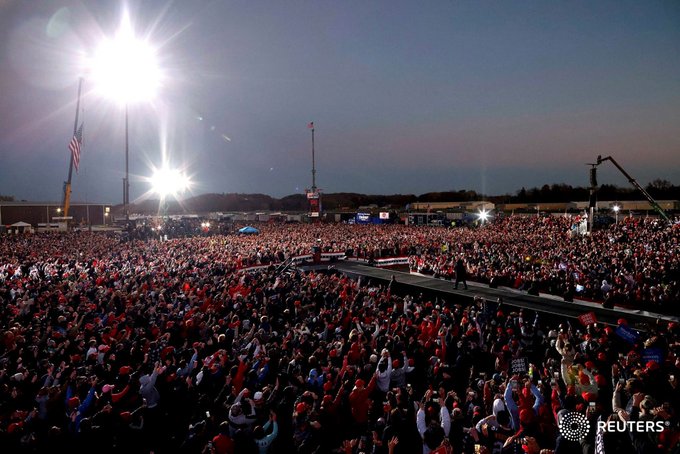
.
- RELATED:
- ♦The Modern Third Dimension in American Economics – HERE
- ♦The “Fed” Can’t Figure out the New Economics – HERE
- ♦Proof “America-First” has disconnected Main Street from Wall Street – HERE
- ♦Treasury Secretary Mnuchin begins creating a Parallel Banking System – HERE
- ♦How Trump Economic Policy is Interacting With The Stock Market – HERE
- ♦How Multinationals have Exported U.S. Wealth – HERE

